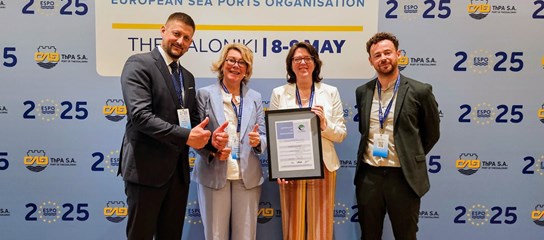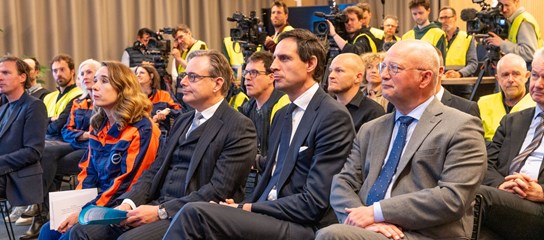North Sea Port collaborates on new chair for monitoring circular economy impact in Flemish sea ports
Over the next two years, the Chair Circular Port Monitoring in Flanders will focus on continuing the development of a monitoring system on the socio-economic impact of the circular economy transition in ports. Brigitte Mouligneau, Circular Flanders: "This collaboration with a unique set of partners provides an important cross-fertilisation between practice, policy, scientific insight and research.”
European frontrunners
The three Flemish seaports already are European frontrunners in terms of circularity. A scientifically proven monitoring system will allow them to make the impact of their circular ambitions and actions tangible through relevant indicators. The monitoring system also considers current obligations regarding sustainability reporting and strategic planning. The results of the chair will be relevant for ports worldwide.
"As an Urban Engaged University, we are committed to help finding solutions for the many sustainability challenges our planet faces, such as climate change, water scarcity and air pollution. With the Chair Circular Port Monitoring in Flanders we demonstrate our commitment to work together with our partners to stimulate innovation and support the transition to a circular economy in our Flemish Seaports. The close collaboration with industry and companies is invaluable, because it enables the rapid spread of knowledge to the workplace and leads to concrete, practical applications with tangible impact on society and the environment," expresses Pieter Ballon, vice-rector fresearch at VUB.
Enriching and inspiring
“At North Sea Port we currently have acces to the raw materials of tomorrow, and are therefore at the forefront of the circular revolution. We encourage the development of circular chains in the port area, in which raw materials and products are continuously reused. In addition, we connect all players involved and support them with our knowledge and experience. The collaboration in the context of this chair is enormously enriching and inspiring. In this way, we assist companies in and around our port area, to achieve their ambitious climate goals and make the port climate neutral by 2050,” Daan Schalck, CEO North Sea Port.
Strengthening international competitiveness
Prof. Dr. Elvira Haezendonck is appointed as chair holder, while Dra Lynn Faut takes on the task of chair coordinator at the VUB. The findings will be published in scientific publications as well as on the Circular Ports website.
Academic coordinator Dra Lynn Faut: “It is important for the Flemish seaports to continue to take the lead in the transition to a circular economy. The negative impact on the environment is thus reduced. But economic opportunities are also created through efficient use of raw materials and the creation of new symbioses. This strengthens their international competitive position. With our research we want to support ports in making the right strategic choices concerning circular economy.”
“Measuring circular ambition is not new,” says chair holder Elvira Haezendonck, full professor of Sustainable Strategy at the Solvay Business School of the VUB. “A broader CE monitor was previously developed in Flanders by the CE Center, but it does not help the ports as initiators. On behalf of Circular Flanders, I conducted an exploratory study into monitoring circularity in ports in 2022. A scientifically based monitoring system will allow ports to communicate the implementation of their circular ambitions and measure the actual socio-economic results for proven relevant indicators. This is certainly true for the partners of the chair, but also useful for other ports worldwide. PIANC (World Association of Waterborne Transport Infrastructure) and IAHP (International Association of Ports and Harbors) have also shown interest in making the results globally known to global ports and port developers.”
Chair Circular Port Monitoring in Flanders | Vrije Universiteit Brussel (vub.be)




